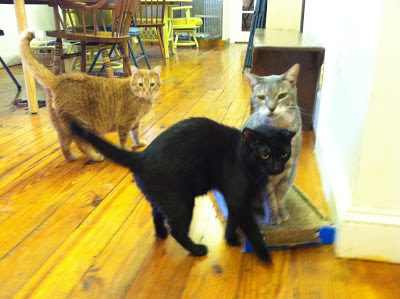The Challenges of Adopting a Puppy or Kitten
We
have all heard the saying “adopt, don’t shop”, but adoption can be a
complicated and sometimes confusing task for pet owners. When it comes to adding a four-legged member
to the family, it is important to look at many factors before making the final
decision of adopting your new family member.
Once
a pet owner decides that they are ready to add a new pet to their family, they
must start to consider many factors to ensure that the best match is made for
the people and the pet. Of course
adoption is a great answer, and there are so many pets looking for their
forever homes, but there are some challenges that need to be addressed before a
decision is made.
The
first thing that should be considered is the rescue or organization that you
are adopting the pet from. It is
important to make sure that the organization is credible and that they are
doing everything that they can to ensure the animal’s safety and health. Unfortunately, many rescues, while trying to
do the right thing, end up creating more risks for young puppies and
kittens. Often times rescues will
combine many small groups of puppies or kittens into one larger group to
transport them from one area to another to be fostered, before being placed in
their forever homes. This can expose the
puppies or kittens to many different diseases or illnesses, therefore causing illness
in these young animals. It is important
to ask the rescue questions about where your pet came from, and how it was brought
to the rescue? It is always important to ask about how long they have been in the last "quarantine" place. My personal recommendation is that the puppies/kittens are in the last foster home for at least 14 days without new pets being brought in. I also always ask where the parents are. I also ask for proof. Too often rescue groups take the puppies and kittens (some even "sell" them and leave the parents behind. As potential pet owners,
you are always asked many questions, but many people forget that they should
also ask questions to the rescue as well.
It is important that both groups know all of the information so that the
best decision can be made!
 |
| Lucy. Rescued from the worst circumstances imaginable. |
Additionally,
after learning about the pet’s history, the new pet owner should make sure to receive
the health records for the pet from the rescue.
Vaccine records and a record of any health issues are paramount to the
short and long term health of your new furry friend. If the pet doesn’t have any records or the
rescue can’t provide documentation of the vaccinations, then you should ask the
rescue to get the records. Rescues
commonly will provide veterinary care, or they can assist you in getting the
proper care. If there is not a signed physical exam report from a veterinarian you should ask why? There is no reason this should not be a part of the pet adoption process. I also call the vet office to confirm, including that they, the vet themselves, gave the vaccines. In many cases the vet only signs an exam form, they do not provide veterinary care. This is also a cause of great concerns for me. In the end, everyone wants
what is best for the animal, so making sure that it has all of the veterinary
care that it needs is very important.
Lastly, every pet owner needs to make sure that they make an overall well informed decision. If something just doesn’t seem right or you aren’t completely sure about adopting a certain pet, then don’t go through with the decision. Make sure to take some time to make sure that this decision is the right one for you and your family. While it might not seem obvious to ask the rescue questions, it is important to become informed so that you can make the best decisions for your new furry family member!
 |
| Scout. rescue pup, all adorable! |
 |
| Jerry. Off the streets rescue.. total love-bug |
The take home message is that there is no way anyone can deny the heart gripping adorableness of a puppy or kitten. It is impossible to resist. The challenge is that there are people who prey on this for profit and at the expense of the animals they procure and distribute. Be very cautious. Stay offline. Seek advice from people you know and trust. And as always, it is buyer beware even though those little ones melt your heart and skew your ability to be cautious.
 |
| My beloved jekyll,, all rescue all the best of everything (and in beagle form). |
Many Thanks to Lydia Schlitz for writing this. Lydia is a pre-vet student working at Jarrettsville Veterinary Center this Summer.
If you have a pet story that you would like to share, or an experience with this condition please add it to our Storyline page at Pawbly.com.
Please also follow us on Pawbly.com, our Jarrettsville Vet, or our Jarrettsville Vet Facebook page, Twitter @FreePetAdvice, and YouTube.













































